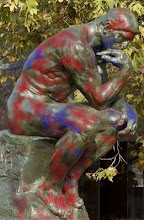The
following is a translation of the top editorial in today’s issue of Anandabazar Patrika, Bengal’s premier
newspaper. The translation is mine. I am sorry I lost the link to the original; if someone can locate it, please send it over.
The worship of the small
A
seventeen-year old in Britain has just invented an ‘application’ which can
break up any item of news into three short paragraphs. All the ‘flab’ would be
trimmed off. Nick D’Aloisio is already being hailed as a computer wizard,
tycoons are coming forward to help fund the happy commercial birth of his
revolutionary brainwave. This invention satisfies a very common and evident
desire of contemporary society – learn
it quick, say it in short, let me know at once. The custom of drastically
summarizing all kinds of reading material has already become widespread. In the
west, classical literature is being sought to be presented to today’s youth in
highly abridged form: the Bible is being peddled in drastically culled summary,
and Shakespeare in sms-text. People these days habitually type ‘lol’ in emails
when they want to laugh out loud;
nobody says I just saw Dilwale Dulhaniya
ley jayenge, because DDLJ does the job.
We want
that a movie should last no longer than an hour and a half; cricket matches
should be concluded in twenty overs, and textual essays limit themselves to a
single line if possible. As an explanation, it is said that people ‘have too
little time’ these days. The pace of life has accelerated greatly; nobody can
afford to give too much time to any one thing. Most people take this assertion
for granted. But what does it mean? Are humans working much harder than before,
is the national product increasing exponentially, are people giving far less
attention to recreation than to clearing files? Or is it that people these days
spend most of their time checking worthless email and text messages, playing
endless games on their mobiles, visiting all kinds of useless sites (entirely
unconnected with the work at hand) on the internet, wandering about shopping
malls, or idly surfing channels on TV? Has mankind’s workload increased, or has
a vast vista of trivial engagements opened up? In fact, the means of ‘entertainment’
have multiplied so explosively and the insane urge to enjoy them all at once has
become so rabid that men cannot concentrate for long on anything any more. Lack
of attention has always been a problem for many; today people have found a very
powerful excuse for never cultivating the kind of self-discipline and
reflective ability that is absolutely essential in order to learn or do
something really well. He was always eager to finish Tagore’s huge novel, but
so much ‘work’ came his way in the shape of nonstop net surfing and channel
surfing that he could never go beyond
the first page. Couldn’t some kind soul make a four-line synopsis of Gora for this unfortunate, and make a
name for himself by providing millions with instant enlightenment?
Wily
manipulators with an eye for the main chance have always been ready with
enticing games to make money out of lazy dilettantes in the mass. They do not criticize the age, they
only want to make money out of the hordes of ignorant fools who define the age.
It is a stupid and arrogant joke to claim to be able to reduce every item of
news to three little paragraphs regardless of the importance of its substance, the
sophistication of its argument and the quality of its writing style. This joke
has thrilled a society which demands to understand an epic by reading the blurb
on the book jacket. But this kind of shortcut insults both the serious journalist
and the mindful reader. The collective which does not recognize it as an insult
need only be contemptuously called h.l.
– no point typing the whole word ‘hopeless’ to describe it (the original
Bangla says hobha for hotobhagyo)



.jpg)


.JPG)

